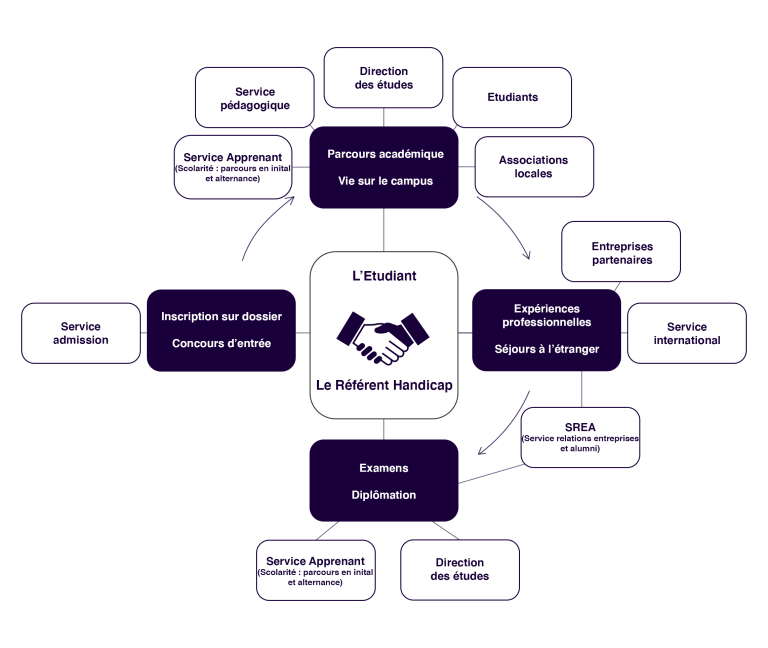General Rules and Regulations for studying in France
Rating and evaluation in France
Attendance
Attendance is compulsory for all courses. All students in the program must be present in class at all times and for all scheduled assessments. Attendance is checked at the beginning of each course using the “So We Sign” platform. Unjustified absences may have an impact on the student’s overall grades.
Homework and Projects
Homework and projects will be assigned throughout the course of your academic studies. All students must complete the assigned homework and projects in order to receive a final grade necessary for validation of the semester. Course evaluation criteria will be explained by the teachers at the beginning of class.
Final Evaluation and Grading System
Each course includes a final assessment, such as a written exam or oral presentation. Students must pass the final assessment in order to complete the course.
All academic grades are scored out of 20. The final average score is calculated from two evaluation factors:
- Continuous assessment
- Final exams
Each of these assessments may be worth either 40% or 60% of the final grade. But it is up to the teacher to confirm which assessment adds the most weight to the final grade. The distribution is indicated in each course syllabus.
For your information, here’s how grades work in France:
- From 18 to 20: Excellent
- From 16 to 18: Very Good
- From 14 to 16: Good
- From 12 to 14: Medium
- 10 to 12: Fair
- From 0 to 10: Insufficient
Credits and Notes
The credits attributed to each module are compatible with the ECTS (“European Credit Transfer System”). Each module is composed of two to four courses and a certain number of ECTS credits is assigned to each module according to the total number of hours of courses within the same module.
The final passing score is 10 out of 20. A student receives ECTS credits when the average grade of the courses in a specific module is equal to or higher than 10. Any mark lower than 10 for the specific module is considered a failure and ECTS credit is not awarded for this module.
Make-up exams
This is a second exam designed to help the student make up the points he or she did not get on the final exams. Depending on your program and school, you may be given the opportunity to retake the exam in order to obtain the necessary grade to pass the semester.
Plagiarism, Cheating and Fraud
Any attempt at fraud, plagiarism or any form of cheating is considered a serious offense under OMNES Education policy and French law. Students found guilty of cheating will be dealt with on a case-by-case basis and may be called before a disciplinary board. The decision to expel the student from the course may be made according to the school rules and French regulations.
European student card
When you arrive, you will get the European Student Card, whether you are a European or non-European citizen. Please note that this card is not linked to the Erasmus Charter.
To find out more about the benefits of this card, please visit the European Student Card website.
This is the European adaptation of the student card. It offers several advantages:
- Administrative documents are digitized and available in a single location. Students can update their profile and documents more quickly and easily.
- It provides access to various campus services.
- It offers students discounts for cultural activities (cinema, etc.).

Contribution to Student and Campus Life (CVEC)
When you register at OMNES Education, you will be asked to obtain and send your CVEC certificate to the school staff in order to validate your registration. This is a financial contribution mandated by the French government for student life services and campuses.
For a better understanding of the CVEC, you can go directly to the dedicated CVEC website.
Registration for all OMNES Education schools cannot be finalized without this certificate, so it is imperative that you obtain it.
.
USEFUL RESOURCES :
For more information, here are the Campus France tutorials:
- 10 things you need to know about the CVEC
- Download the CVEC Procedure
This contribution applies to all registered students, but not to exchange students (who are covered by a separate agreement).
- Or, you are subject to the CVEC, and must pay a fee of €95 per academic year, payable online via the government website. You will then receive a certificate of payment of the CVEC.
- Or, you are exempt from the CVEC (with proof of exemption from the CROUS or another organization), in which case you can obtain a CVEC exemption certificate on this same website.
Omnes Education’s tools for successful studies in France
an Academic Glossary
| ENGLISH | FRENCH |
| To enroll in a university | S’inscrire dans une université |
| Enrolment | L’inscription |
| A student card | Une carte d’étudiant |
| An undergraduate | Un(e) étudiant(e) de premier cycle |
| A fresher / a freshman | Un(e) étudiant(e) de première année |
| A postgraduate student | Un(e) étudiant(e) de troisième cycle |
| The academic year | L’année universitaire |
| A reading | Une conférence |
| A lecture hall | Un amphitéâtre / un amphi (familier) |
| A B.A. degree | Une licence de lettres |
| Schedule | Emploi du temps (EDT) |
| A final exam | Un partiel |
| On-going evaluation | Contrôle continu |
| A bachelor’s degree | Une licence |
| Academic writing | Un mémoire |
Preparing for assessments
When preparing an essay or dissertation:
- Analyze and understand your subject.
- Draw up a schedule including key milestones.
- Explore your subject by reading books, articles and magazines, and take notes.
- Based on what you’ve written down, structure your ideas by sketching out an initial plan.
- Once you’ve established your plan, start writing. Make a draft based on your notes. Don’t try to write everything right away, but try to spread your writing out over several days.
- When you have finished writing, take a step back to detach yourself from your work. Then, proofread, revise and edit if necessary.
Tips: ask someone else to proofread your work: they can bring a fresh perspective and observe things you may have missed.
When preparing an oral presentation:
- Analyze your subject and choose what’s essential.
- Gather your ideas and find resources.
- Based on what you’ve found, start structuring your ideas by sketching out a plan.
- Once you’ve structured your ideas, design your presentation visually using PowerPoint or other platforms.
- Be sure to adapt your presentation and speech to your audience.
- Don’t read your notes, just memorize them if necessary. Make eye contact with the audience.
- Don’t display your entire speech on your slides – less text is better.
- Anticipate answers if there are questions.
Tips: rehearse your presentation with your slides beforehand, so you can adjust your timing, speech and movements. We also advise you to anticipate any technical problems that may arise. If you come prepared, the rest should come naturally!
When preparing for a assessment :
When you are about to take an exam, you need to review and learn what you have been taught in class.
- Stay informed about your exam topic, so you know the scope of what you need to study.
- Avoid revising at the last minute. If you study in advance, you’ll know your subject better.
- Make sure you know when your exam will take place. This will help you plan your revisions.
- A few days before the exam, check where it will be held and at what time. This will help you plan the means of transport you’ll need.
- On the big day, make sure you have all the necessary equipment (pen, spare pen, eraser, water bottle).
Tips: Don’t hesitate to ask your teacher about grading criteria and exam procedures, to get an idea of what you need to focus on.
Library
As an OMNES Education student, you will have access to an exclusive digital library and newsstand application:
It provides centralized access to a wide range of multimedia resources for students, teachers, and researchers at each school.
You can access books, articles, specialized and scientific journals, market research, financial and business information. Throughout your studies, whether you want to take a class, read a book recommended by a teacher, write a report, consult a market study, research academic articles for your thesis or explore a current topic: the library meets your needs.
While the internet is a great source of information, you will find many expert resources in the digital library, which are only accessible with your student account.
It is a digital newsstand with thousands of newspapers from over 120 countries. You can read your favorite newspapers on your smartphone with your student account.

Discover the municipal library in your arrondissement on the Paris library website.
You can find the nearest bookshops to your arrondissement on the Paris librairies website.

Find your nearest public library on the Bordeaux library website.
You can find your nearest bookshop HERE.
Discover the exciting English bookshop in Bordeaux.

Find your nearest public library on the Lyon library website.
Discover bookshops near you here.

Find your nearest public library on the Chambéry library website.
Find a bookshop near you here.
Student Life

Getting involved in a student organization is one of the best ways to discover a wide variety of activities, meet new people, share ideas, learn new skills, have unique experiences and have fun.
Paris, Lyon, Bordeaux and Chambéry host numerous student clubs in various fields: cultural, ecological, communication and media, sports, dance, humanitarian, international events, art, etc.
To find out more, contact your schools and discover the existing clubs on your campus. As a new student, we encourage you to join a student organization that interests you as it is an excellent opportunity to experience student life first hand.
Student well-being
The mental health and well-being of our students is our priority. We know how confusing it can be to move abroad and live in a cultural environment that is not our own. This is why the OMNES Education Group has put in place several support tools to listen to your needs.
In order to limit a possible culture shock, we invite you to read our selection of books that will give you an overview of the French culture:
- Sixty million Frenchmen can’t be wrong by Jean-Benoit Nadeau and Julie Barlow
- Paris VS New-York by Vahram Muratyan
- Almost French, a new life in Paris by Sarah Turnbull
- F is for France: A Curious Cabinet of French Wonders by Piu Eatwell
Moral and psychological assistance
Because your well-being is our priority, we offer you a unique access to a moral and psychological assistance platform, called Eutelmed with complete services to inform you and allow you to talk to professionals in your language.
- Eutelmed platform allows you to call and talk to a psychologist 24/7, in fifty languages.
- You can access information on how to take care of your morale, your life balance, your stress, your emotions and benefit from the advice of experts.
Once registered, you can ask for the access code to your school.
Association HUGO
Because bullying at school can affect people of all ages and backgrounds, the Hugo association, set up by a Sup de Pub graduate, is here to help you if you find yourself in such situations. Don’t hesitate to contact the association, whose team will be able to advise you when it comes to dealing with harassment.
STUDYING WITH A DISABILITY WITHIN THE OMNES EDUCATION GROUP
In all OMNES Education schools, efforts are constantly being made to improve the quality of assistance for students with disabilities, recognized moreover by certification under the Qualiopi reference system since early 2021.
As part of its social and environmental approach, equal opportunities and education for all are essential rights that the OMNES Education Group wishes to defend for all its students.
The primary aim of OMNES Education is not only to facilitate disabled students’ access to higher education, but also to offer them the comfort of daily work so that they can devote themselves to their studies with complete peace of mind.
Aware that it’s not always easy to talk about a disability outside a private setting, and that disabilities are not always visible, OMNES Education does everything in its power to ensure that students have the best possible conditions of confidence and discretion in which to confide in us about their disability.
The disability may be temporary or permanent. In all cases, solutions exist and students have the option of being accompanied. To initiate these procedures, students should contact their disability advisor.
Our Omnes Education Team
Although the disability advisor remains the first point of contact, all the school’s departments can help students according to their needs. It’s the collaboration between the student, the advisor and the school’s various departments that will ensure successful support.
What’s more, the student can be supported at any stage of his or her academic career with OMNES Education.
Even if they have not declared their disability on admission, students can turn to the advisor for help with internships, international travel, exams or, more generally, whenever they feel the need for support with their studies.
However, anticipation is the most important element in the success of support initiatives, so it is important to plan ahead if the student wishes to benefit from accommodation for a specific deadline (internship, exam…).
The diagram below shows that, whatever the stage of the student’s studies at OMNES Education, he or she can rely on the support of the disability advisor and the various services available within the school.
Accompanying device
student with a disability
This diagram highlights several elements:
- The disability advisor and the student work together and are at the heart of the decision-making process.
- It is possible to initiate a coaching process at any stage of the academic career.
- At each stage, the school’s various departments are available to provide support.
Want to know more? If you have a disability and would like to know how your campus can help you, don’t hesitate to ask for the contact details of your school’s disability advisor.
Third Time
If you have a disability, such as dyslexia, dyspraxia or other, you can request a third time during an exam.
When your disability is a barrier to an assessment, you can get help. You may be granted an increase in time called one-third time (i.e., an additional one-third of the time originally scheduled) to allow you to complete an evaluation in a favorable manner.
If you would like to know more, please contact the disability representative on your campus or in your program.

Find out how your host city can support you

Handicap Paris – this site has a wealth of user resources and essential information tools on access to rights and services for Parisians with disabilities.
The Maison Départementale des personnes Handicapées de Paris (MDPH) is a public body that can guide you, facilitate your procedures and give you easier access to
your rights.
69 rue de la Victoire – Paris 9e.
9 a.m. to 3 p.m., Monday to Friday
Telephone: +33 1 53 32 39 39
contact@mdph.paris.fr

Whether in the areas of education, urban planning, transportation or access to citizenship, the City of Lyon is committed to creating conditions that are favorable to the urban and social inclusion of people with disabilities, so that everyone can participate fully in the life of the city.
To learn more about what the city can do to support you, you can visit the following site

Handitourism – Chambéry Tourist Office is committed to providing people with disabilities with reliable, consistent, high-quality information on the accessibility of the city’s various sites and places of interest (such as accommodation, restaurants, etc.) according to their disability (motor, visual, hearing and mental).
Savoie Departmental House for the Disabled – Information available on assistance in the Savoie region.
110 rue Ste Rose
73000 CHAMBÉRY
Telephone: +33 4 79 75 39 60
Telephone: 0 800 08 00 73

Ville et Handicaps: the city of Bordeaux is working to ensure that people with disabilities can enjoy full, independent accessibility. Consult the “Bordeaux, a city for everyone” Disability Plan.



